Apples are available on the Russian and Ukrainian markets all year round, since a subtropical climate of middle latitudes and black soil are well suited for growing this fruit, and special conditions are not required for long-term storage. The properties of this fruit vary depending on the particular variety. Also, the possible benefits are determined by the general condition of the human body.
For example, in diseases such as diabetes, heart and blood vessel diseases, apples bring significant benefits to the body, and in cases such as stomach ulcers and gastritis, they can be harmful, due to the chemical composition. The properties of this fruit also vary significantly depending on the processing method.
Content
Useful properties of apples and harm to the body
The maximum content of nutrients is fixed in freshly picked fruits. But it is important to note that the fruits are used not only in their raw form: soaked, dried and baked apples retain a rich composition of nutrients and are used as independent dishes or in combination with other products.
Fresh
Apples that are not thermally and chemically processed contain a lot of vitamin C in their biologically active form. It helps maintain the body's defenses, accelerates recovery from infectious and inflammatory diseases, and is a powerful antioxidant that protects cells from the effects of radicals and oxidation products.
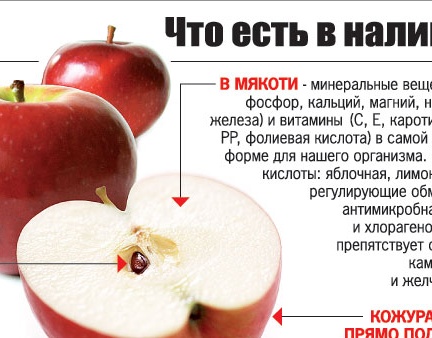
In combination with rutoside, better known as rutin, vitamin C exerts an angioprotective effect, reduces capillary fragility, and increases the vascular endothelial firmness and elasticity. During pregnancy, apples are a source of such essential substances as folic acid and iron, which are necessary for the proper development of the fetus.
Fresh fruits are rich in flavonoids - they protect the cardiovascular system, have a normalizing effect on the processes of energy metabolism. These substances have anti-sclerotic and neurotropic effects. The bulk of this fruit is water and fiber. 100 g of apples also contain from 5 to 12% of sugars, of which fructose and galactose predominate. Due to the presence of coarse plant fibers, sugar is released slowly, which leads to a low glycemic index of this product.
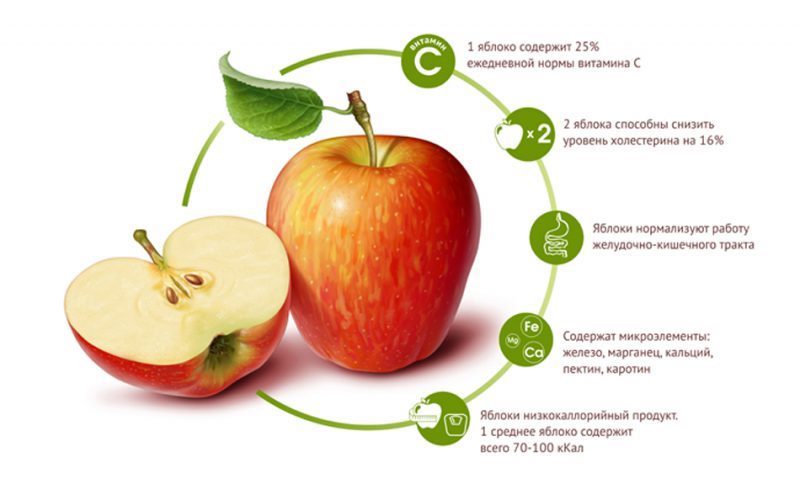
Apples are rich in the following fat-soluble vitamins:
- Retinol (Vit. A) - is necessary for the proper functioning of the organ of vision, gives natural radiance and elasticity to the skin, protects the body from premature aging.
- Tocopherol (Vitamin E) - takes part in the synthesis of red blood cells, has anti-inflammatory properties, is necessary for the synthesis of nucleotides and mediators.
- Vitamin K (phylloquinone, menadione, aminonaphthol) - is an important component for the synthesis of blood coagulation proteins, affects the synthesis of osteocalcin, supports bone mineral density.
- Carotenoids (lutein, zeaxanthin, beta-cryptoxanthin) are powerful antioxidants that protect the photoreceptors of the retina of the eye from free radicals, are a means of preventing cataracts and macular degeneration.

Fresh fruits contain essential amino acids - valine, isoleucine, lysine, threonine, phenylalanine. They also have a unique mineral composition:
- Fe - an important factor in blood formation, is an activator for B vitamins.
- K - controls the processes of excitation and conduction in the heart muscle, it is necessary for the contraction of muscle fibers.
- Ca - the main structural element of bone tissue, is necessary for the transmission of nerve impulses, supports stable heart function.
- Magnesium - has a normalizing effect on protein, carbohydrate and fat metabolism, is an anti-stress factor.
- P - improves memory, concentration, is an important factor in energy metabolism, is necessary for the health of the musculoskeletal system and teeth.
- Copper - takes part in the synthesis of hemoglobin and contractile proteins, supports the firmness and elasticity of connective tissue fibers.
- Manganese - reduces blood sugar by stimulating the synthesis of endogenous insulin, supports the functioning of the thyroid gland.
When preparing juices from fresh fruits, all vitamins and minerals are preserved, however, dietary fiber is destroyed. The intake of juice in its pure form can cause disruption of the digestive tract, especially in the presence of UBI, gastritis and other disorders in the acute phase. Such juice also negatively affects tooth enamel and can cause its destruction, therefore, after taking the juice, it is recommended that you brush your teeth or rinse your mouth.
Baked
After heat treatment, ascorbic acid changes the chemical structure and becomes inactive. Baked fruits contain pectin, which has a positive effect on the motility of the gastrointestinal tract. This long-chain polysaccharide is a prebiotic, contributes to the normalization of the intestinal flora. The regular use of such a dish will strengthen the immune system and protect the body from infectious agents.

Baked fruits contain a minimal amount of calories and do not cause a sharp increase in glucose in the blood. The finished dish is rich in fructose, sucrose, glucose. It does not contain starch. Baked fruits have low allergenic properties, so they are suitable for the diet of pregnant women. Also, this product is used as the first food for infants, because it does not cause colic and flatulence.
Soaked
When soaking apples, the activity of all vitamins is preserved, some types of organic acids accumulate. The calorie content of the finished dish depends on the amount of ingredients and variety used and significantly exceeds the energy value of fresh fruits. The average value is 110-130 kcal.
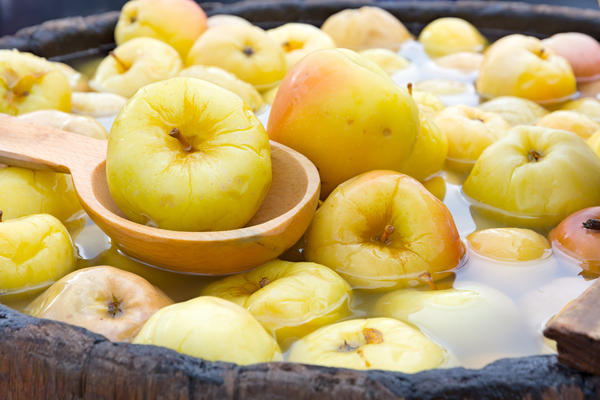
Soaked fruits are used to strengthen immunity during colds, and also help reduce the duration of SARS and flu. During fermentation, lactic acid and tartar alcohol are formed, which are not only natural preservatives, but also favorably affect the state of health. Lactate is an energy source for the heart muscle, takes part in the metabolism, improves skin condition.
Soaked apples have a positive effect on the state of the digestive system, improve peristalsis, however, their frequent use can trigger an exacerbation of chronic inflammatory diseases, accompanied by increased acidity of the gastric juice.
Dried
This product, although it contains a lot of carbohydrates, has a low glycemic index. Apple drying contains about 28-40 g of water, 60 g of sugars and 10 g of fiber.They differ from fresh ones in the amount of iodine, which is necessary for the thyroid gland to function properly.
A high concentration of K allows you to use this type of dried fruit to improve the condition of the cardiovascular system. Also, drying will help normalize blood pressure and hormonal levels.
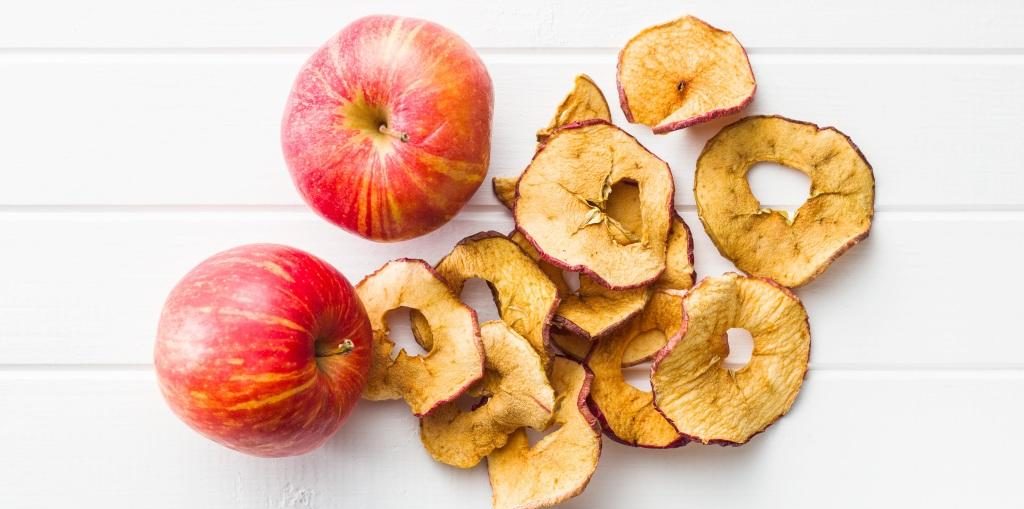
Apple drying is recommended to fill the deficiency of minerals and vitamins during pregnancy and breastfeeding. However, it is necessary to limit their use in diabetes mellitus, impaired glucose tolerance, thyrotoxicosis and overweight.
 You may be interested in:
You may be interested in:Frozen
With deep dry freezing, all fruits retain their beneficial properties for 6 months. In this case, oxidation of iron and its transition into a difficult to assimilate form are possible. Also, frozen fruits have a lot of fructose and glucose, which can have a negative effect on tooth enamel.
However, malic, tartaric and citric acids accumulate. This slightly changes the taste. To obtain the highest quality product, you need to choose only solid, undamaged fruits and remove seeds from them to avoid the accumulation of hydrocyanic acid. Upon repeated freezing, the product becomes dark, lethargic. It is undesirable to eat, it can cause gastrointestinal upset.
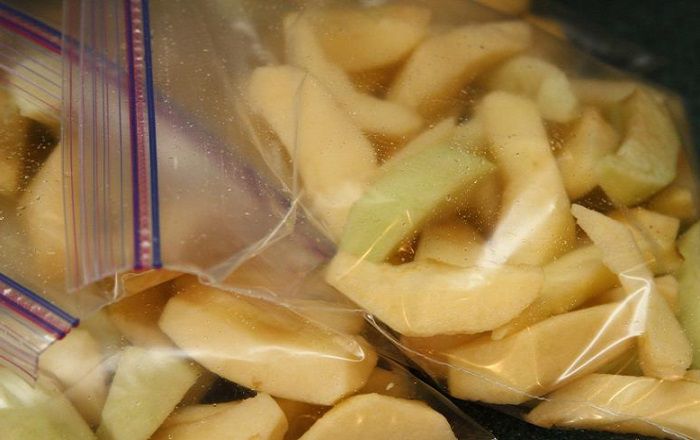
Contraindications to the use of apples
Due to the high content of organic acids (malic, citric, tartaric), the use of fresh fruits in the presence of inflammatory diseases must be limited. Particular caution should be exercised in the presence of pathologies that are accompanied by hyperacidity of the gastric secretion: gastritis, duodenitis, reflux disease, gastric or duodenal ulcer. Among other limitations are candidiasis and fungal lesions of various localization.
You should also take into account the side effects of taking a large number of fruits, which contain a lot of sugars and fiber. Excessive consumption of fruits can cause flatulence and diarrhea, as the intestinal fermentation processes are significantly enhanced.
People with diabetes can consume a small amount of fruit without harming the body. The use of this product by a nursing woman can provoke allergic reactions in infants, since pigments can pass into breast milk. They can also cause intestinal colic and bloating.
Indications and Health Benefits of Apples
Most nutritionists and gastroenterologists recommend eating apples in your daily diet as a snack. This will help to ensure the intake of the necessary amount of vitamins and other biologically active components, and prevent the development of a huge number of diseases.
 You may be interested in:
You may be interested in:For weight loss
Subject to the diet, apples must be included in the diet, as the fruit, although it contains a high concentration of sugars, has a low GI. Pectin helps to normalize intestinal microflora and stimulates peristalsis.Due to the high content of coarse dietary fiber, apples help cleanse the intestines of toxins and toxic substances, remove excess fluid from the body and help fight swelling.

Unloading apple days are often recommended for weight loss. However, this can provoke a violation of the intestines, cause pain and discomfort in the abdomen. For weight loss, it is best to choose acidic varieties: Pink Lady, Bessemyanka, Granny Smith, Antonovka.
To increase immunity
To increase the nonspecific resistance of the body, it is necessary to eat foods rich in various vitamins. Apples contain a lot of B vitamins. The greatest amount of vitamin C is in soaked fruits, but fruits that have undergone heat treatment will be ineffective. The flavonoids contained in them have the ability to stimulate the production of endogenous interferon, which significantly accelerates recovery during colds and SARS.
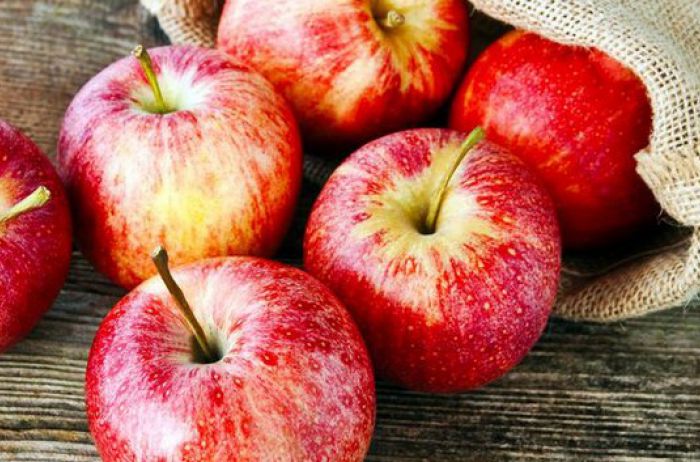
For the heart and blood vessels
Apples contain rutin and ascorbic acid, which are necessary to strengthen the vascular wall and eliminate bleeding. A high content of folic acid and iron is the prevention of deficient anemia. Quercetin and pectin have a lipid-lowering effect, therefore apples are a reliable protection against atherosclerosis and are recommended for use by people at high risk of developing ischemic lesions of the heart and brain.

Regular use helps get rid of puffiness, remove excess fluid from the body and normalize blood pressure.
For digestion
Fresh apples contain fibers that help to remove toxins and metabolic products from the intestinal lumen. Their use is useful for those suffering from chronic constipation and irritable bowel syndrome. With dysbiosis, fresh fruits help restore the flora, since pectin is one of the most common prebiotics.
With diabetes
In diabetes mellitus, it is recommended to use apples to prevent vascular complications. Vitamin A helps prevent the development of diabetic retinopathy, and B vitamins protect nerve fibers. Rutin and vitamin C strengthen the vascular wall. They also help lower blood cholesterol.
With diabetes, you should not eat dried fruits, as they are high-calorie and can provoke a change in blood glucose levels. Using freshly squeezed juices is also not recommended, as they do not contain fiber and have a higher glycemic index than whole fruits.
How many apples can I eat and how to eat
This fruit, familiar to all, is included in various menus - dietary, children's, as an everyday addition to the main diet. You can diversify the menu with both fresh fruits and processed ones:
- Fresh fruits. Many experts recommend eating 1-2 medium-sized apples daily. To increase the bioavailability of fat-soluble vitamins, they can be combined in salads with other fruits and vegetables (carrots, avocados) and vegetable oil. For young children, mashed potatoes or grate the fruit. Advice!In order to reduce the risk of flatulence, you can add other fruits. This will help avoid negative effects on tooth enamel.
- Fresh juice. It does not contain fiber, therefore it can not be used for weight loss.However, such a drink is the source of most vital elements. You can increase the positive properties of apple juice using it in combination with pumpkin, carrot, grape, strawberry or peach.
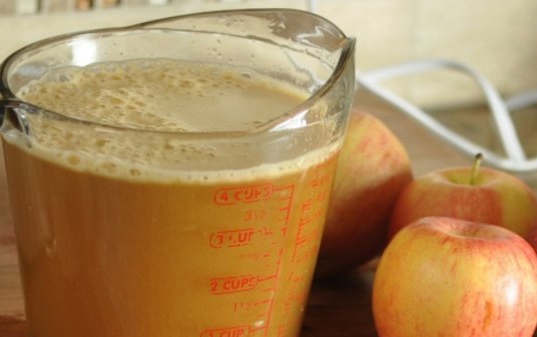
The calorie content of juices is higher than that of whole fruits, they can increase blood glucose levels, therefore, are not recommended for diabetics. Using juices on an empty stomach is prohibited due to the irritating effect on the mucous membrane. Juice stored in the refrigerator for about 48 hours, it can also be preserved after sterilization.
- Baked in the oven. For baking use apples of all sorts, but it is best to choose unripe, hard fruits without damage. Pre-remove the middle with the bones. To maintain maximum beneficial properties, do not add sugar. Such a product is easily absorbed, and its use is not accompanied by increased gas formation. This allows you to use apples in the diet and children's menu. They are used as an independent dessert, added to cereals or pastries.

Oven Baked Apples - Soaked. This product as a separate dish can cause heartburn or abdominal pain, but it goes well with fried meat, vegetables and desserts. For soaking use ceramic, glass and wooden utensils. For good fermentation, add sugar or honey, as well as various additives to taste: cinnamon, currant leaves, cranberries. For the preparation of soaked apples on average it will take about 15-20 days.
- Dried With the development of modern technology, there are many ways to make dried fruits from apples. The most popular methods are in the oven, a special electric dryer, microwave, and outdoors. It is best to choose early varieties with a thin skin, for example, Antonovka or Aport. Cut them into thin slices or rings, and then treat with lemon juice or sodium chloride solution. After that, spread on a baking sheet and dry.
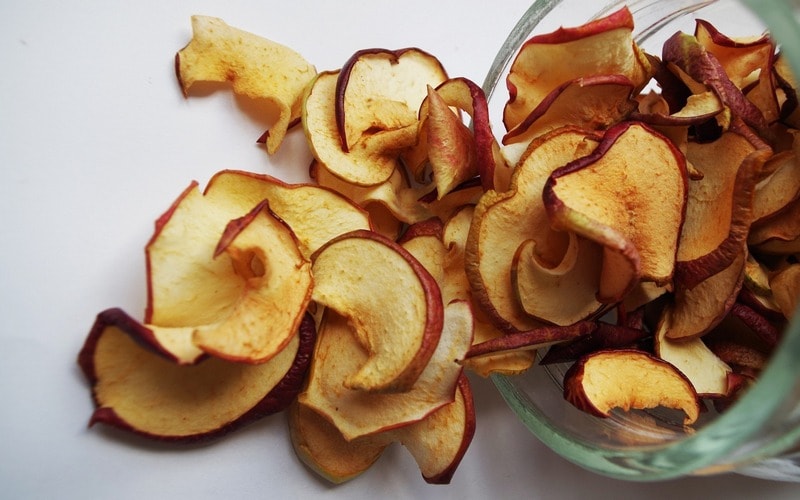
Such a product contains a huge amount of potassium, manganese, magnesium, iron. In its own form is a healthy and satisfying snack. It can be used for cooking compotes, pastries and other dishes. - Frozen. Most varieties are well stocked and are available all year round. However, with prolonged storage, the content of ascorbic acid, thiamine and some other vitamins is significantly reduced. This can be avoided by freezing. Before being placed in the freezer, the fruits are washed, cut into slices, and placed in storage containers. After defrosting, apples may become dark in color, however, their palatability does not change. Frozen fruits are most often used for making pies, roasting poultry, stewed fruit.
- Compote. It has a significantly lower calorie content than juice. To prepare a tasty and fragrant compote, apples are combined with cherries, pears, and various berries. It is best to add fruit to cold water and after boiling, cook without boiling over low heat for 10 minutes. You can also only bring the compote to a boil, remove from the stove and leave to cool with the lid closed. Sugar is added at the end, but sugar-free compotes are more useful. The drink is rich in trace elements and vitamins, however, it is not recommended to drink more than 2 glasses per day.Important!After cooking, the benefits of fruits are significantly reduced, so it is better not to boil the drink.
Common questions
The use of apples in the daily diet will help maintain vitality and strength, avoid vitamin deficiency and activate immune defense. However, the possible risks when consuming fruits in large quantities should be taken into account: pseudo-allergic reactions, bloating, diarrhea, pain and discomfort along the intestines.

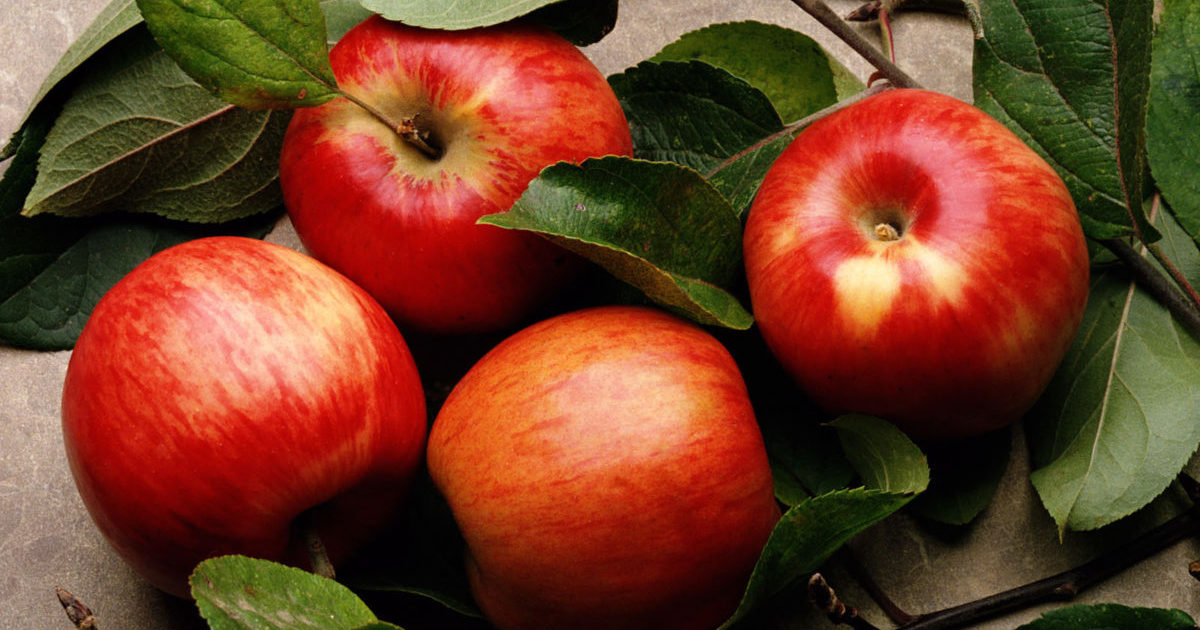
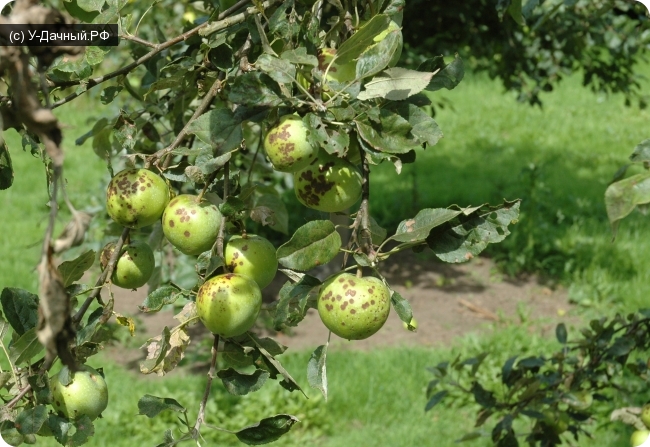
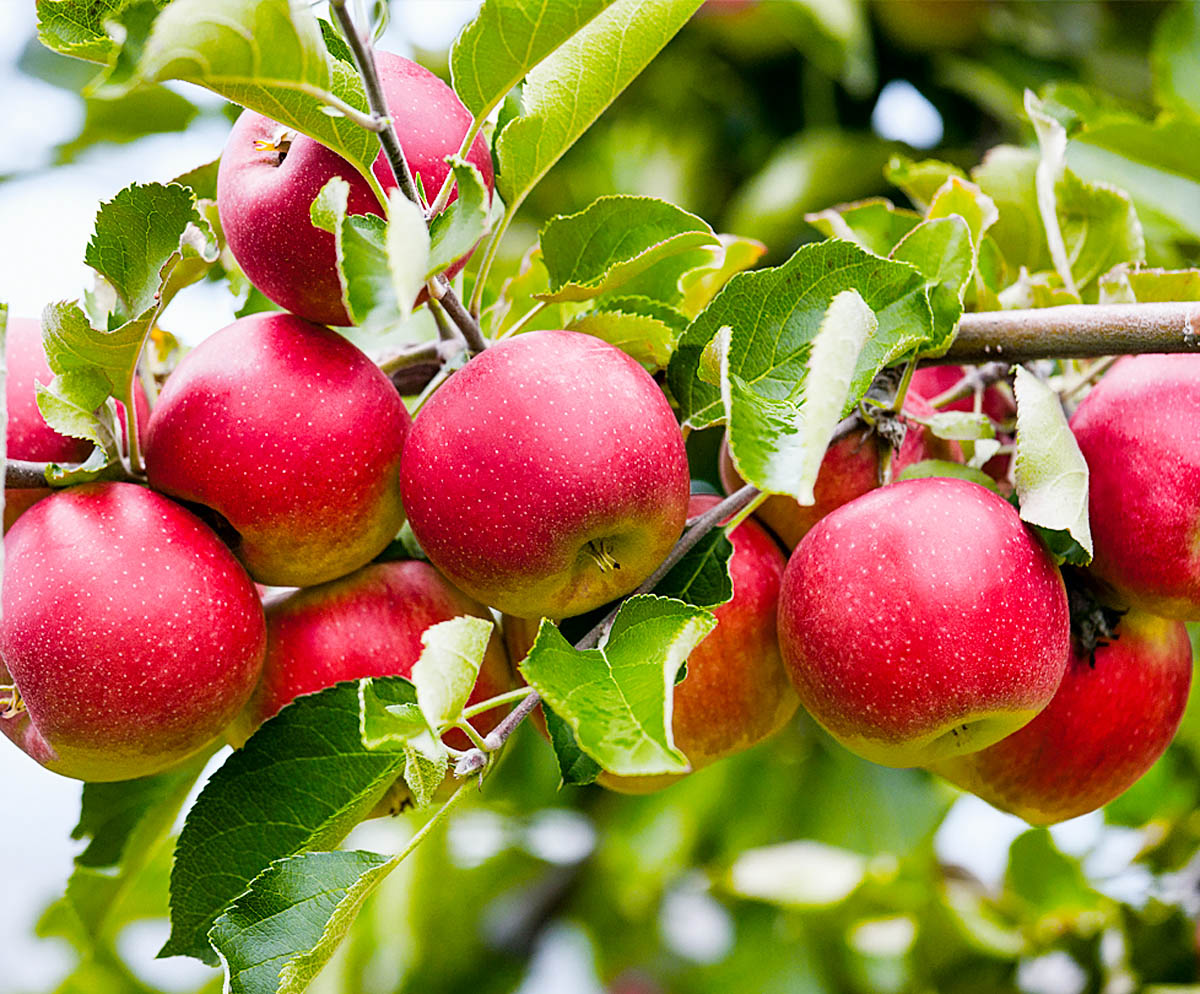
 Autumn processing of apple trees from pests and diseases: how to spray, terms
Autumn processing of apple trees from pests and diseases: how to spray, terms How to plant an apple tree in the fall
How to plant an apple tree in the fall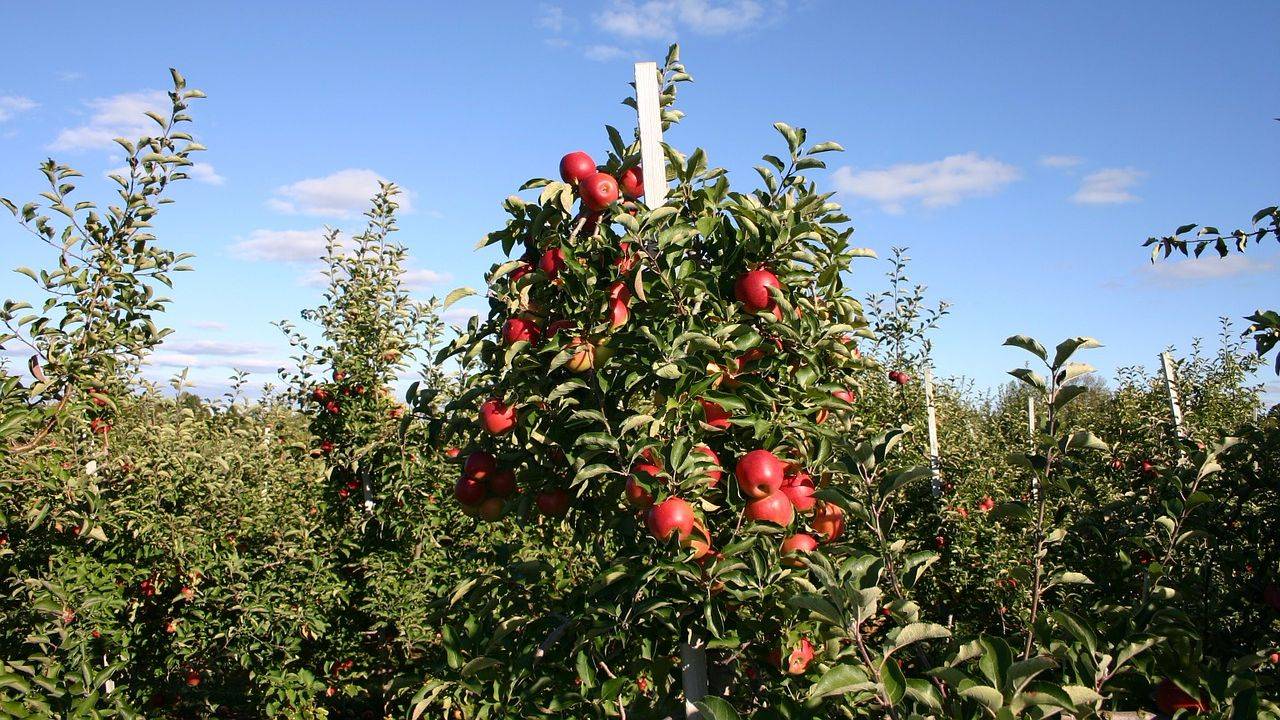 How to prune a columnar apple tree in autumn: features, timing, patterns
How to prune a columnar apple tree in autumn: features, timing, patterns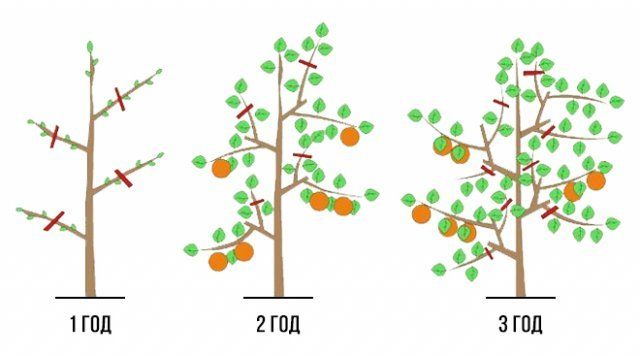 Autumn apple pruning scheme for beginners
Autumn apple pruning scheme for beginners